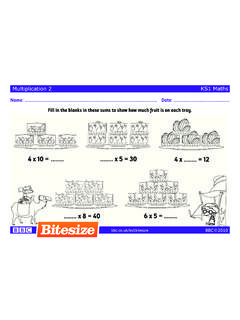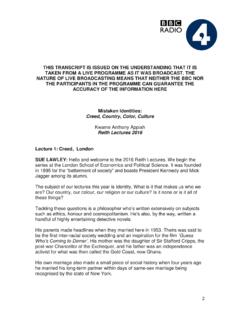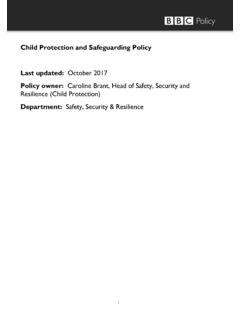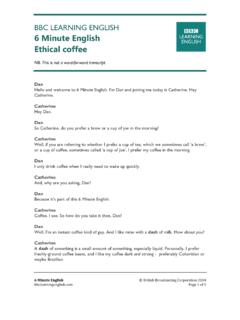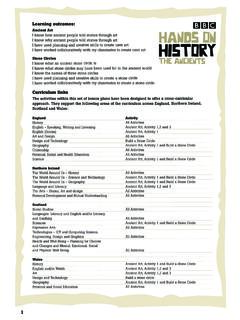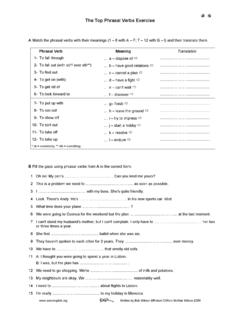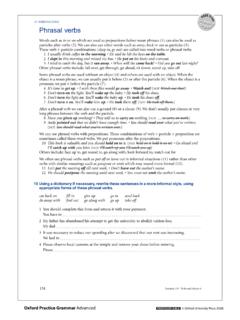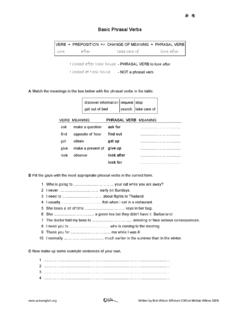Transcription of Modern British Families - BBC
1 British Broadcasting Corporation 2007 1 Modern British Families British Broadcasting Corporation 2007 2 The Modern family Father leaves for work in the morning after breakfast. The two children take the bus to school, and mother stays at home cooking and cleaning until father and the kids return home in the evening. This is the traditional picture of a happy family living in Britain. But is it true today? The answer is - no! The past 20 years have seen enormous changes in the lives and structures of Families in Britain, and the traditional model is no longer true in many cases. The biggest change has been caused by divorce. As many as 2 out of 3 marriages now end in divorce, leading to a situation where many children live with one parent and only see the other at weekends or holidays. There has also been a huge rise in the number of mothers who work. The large rise in divorces has meant many women need to work to support themselves and their children.
2 Even when there is no divorce, many Families need both parents to work in order to survive. This has caused an increase in childcare facilities, though they are very expensive and can be difficult to find in many areas. In addition, women are no longer happy to stay at home raising children, and many have careers earning as much as or even more than men, the traditional breadwinners. There has also been a sharp increase in the number of single mothers, particularly among teenagers. Many of their children grow up never knowing their fathers, and some people feel the lack of a male role model has a damaging effect on their lives. However, these changes have not had a totally negative effect. For women, it is now much easier to have a career and good salary. Although it is difficult to be a working mother, it has become normal and it's no longer seen as a bad thing for the children. As for children themselves, some argue that Modern children grow up to be more independent and mature than in the past.
3 From an early age they have to go to childminders or nurseries, and so they are used to dealing with strangers and mixing with other children. So while the traditional model of a family may no longer be true in Modern Britain, the Modern family continues to raise happy, successful children. British Broadcasting Corporation 2007 3 Glossary divorce - when a marriage ends and the former husband and wife separate from one another a huge rise - a very big increase/growth (opposite to fall/decrease/decline) to support - here, to provide with a home and the necessities of life childcare facilities - special institutions whose job is to look after children while parents are working raising - bringing up and educating breadwinners - a breadwinner is the person who earns the most money in their family sharp - here, big and happening over a short period of time single mothers - women who raise their children by themselves because they live separately from the children's fathers lack - if there is a lack of something, there is not enough of it male role model - a man who thinks and acts in the way that is traditionally perceived as being typical of men nurseries - places equipped for looking after very young children dealing with - managing, doing what is necessary to achieve the result you want mixing with - socialising, living together with, joining British Broadcasting Corporation 2007 4 1.
4 Reading Quiz Are these sentences true or false? Circle the correct answer. 1. Divorce is not common in Britain. True / False 2. Childcare is not cheap in Britain. True / False 3. Women can now earn as much as men. True / False 4. Many mothers nowadays are not married. True / False British Broadcasting Corporation 2007 5 2. Vocabulary Do the following verbs mean GO UP or GO DOWN? 1. Increase _____ 2. Decrease _____ 3. Fall _____ 4. Rise _____ 5. Grow _____ 6. Decline _____ 024681012141618 JanFebMarchAprilMayJune The graph shows sales for the first half of the year. Use the verbs from above to complete the sentences. There may be more than one possible answer. You may need to change the tense of the verbs. 1. Sales _____in February. 2. Sales _____ again in March. 3. However, sales _____in April. 4. Sales continued to _____ in May. 5. In June, sales _____. British Broadcasting Corporation 2007 6 3. phrasal Verbs Look at the phrasal verbs below.
5 Can you match them to their definitions? 1. Bring up a. care for 2. Grow up b. educate, give food, clothes etc 3. Look after c. become older and mature 4. Deal with d. socialise 5. Mix with e. manage Now complete the sentences below by using one of the phrasal verbs in the correct form. 1. Actually, girls usually _____ faster than boys. 2. He s not very friendly. He doesn t _____ other people very well. 3. I was _____ by my grandmother. She taught me everything I know. 4. It s a very stressful job. I have to _____ lots of problems. 5. When my parents went out at night I had to _____ my younger brother. British Broadcasting Corporation 2007 7 4. Wordsearch Try to find the words associated with FAMILY in the puzzle below. There are ten words to find. Words can be written horizontally (g), vertically (i) or diagonally (m). Z X C V M O T H E R N M L K C J H G F D S A Q W F E R O T S Y A U I O P A A S D U I F G U H J B T K S L M S N B V N C R H X O Z A T I S D F T O E G N H J E K N L P O T R I U Y T R R E W Q A H S D F G H J K K L M N E B U N C L E C V I A X R D F V R T H M Y G D Z C P A R E N T S J Y B S N FATHER MOTHER COUSIN BROTHER SISTER AUNT UNCLE PARENTS SON KIDS British Broadcasting Corporation 2007 8 Answers 1.
6 Reading Quiz Are these sentences true or false? Circle the correct answer. 1. Divorce is not common in Britain. False 2. Childcare is not cheap in Britain. True 3. Women can now earn as much as men. True 4. Many mothers nowadays are not married. True 2. Vocabulary Do the following verbs mean GO UP or GO DOWN? 1. Increase GO UP 2. Decrease GO DOWN 3. Fall GO DOWN 4. Rise GO UP 5. Grow GO UP 6. Decline GO DOWN The graph shows sales for the first half of the year. Use the verbs from above to complete the sentences. There may be more than one possible answer. You may need to change the tense of the verbs. 1. Sales FELL/DECREASED/DECLINED in February. 2. Sales FELL/DECREASED/DECLINED again in March. 3. However, sales INCREASED/ROSE/GREWin April. 4. Sales continued to INCREASE/RISE/GROW in May. 5. In June, sales FELL/DECREASED/DECLINED. 3. phrasal Verbs Look at the phrasal verbs below. Can you match them to their definitions?
7 1. Bring up b. educate, give food, clothes etc 2. Grow up c. become older and mature 3. Look after a. care for 4. Deal with e. manage 5. Mix with d. socialise Now complete the sentences below by using one of the phrasal verbs in the correct form. 1. Actually, girls usually GROW UP faster than boys. 2. He s not very friendly. He doesn t MIX WITH other people very well. 3. I was BROUGHT UP by my grandmother. She taught me everything I know. 4. It s a very stressful job. I have to DEAL WITH lots of problems. 5. When my parents went out at night I had to LOOK AFTER my younger brother. 4. Wordsearch M O T H E R C F O S A A U I U B T S S N R H O T I T O E N E N T R R H K E U N C L E I R D P A R E N T S S British Broadcasting Corporation 2007 9




